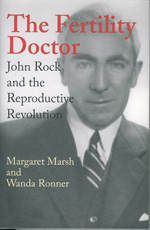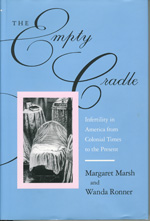The Fertility Doctor: John Rock and the Reproductive Revolution. Baltimore: Johns Hopkins University Press, 2008.
“A fascinating biographical study of a key figure in twentieth-century America… a complete portrait of John Rock as a son, brother, husband, father, student, doctor, researcher, and public figure.”—Elizabeth Siegel Watkins, author of On the Pill: A Social History of Oral Contraceptives, 1950–1970, and The Estrogen Elixir: A History of Hormone Replacement Therapy in America
“A spell-binding analysis of the development of modern reproductive medicine.”—Luigi Mastroianni, Jr., M.D., University of Pennsylvania
“A fast-paced narrative that weaves the characters and the times into a fascinating story.”—Teresa K. Woodruff, Nature America
“The authors bring a man and a century to life as they recount two primary discoveries underlying women’s still controversial reproductive rights.”—Publishers Weekly
“Marsh and Ronner’s collaborative efforts make for a fascinating and important study of Rock and his contributions to the science and culture of reproductive medicine.”—Wendy Kline, Isis
“This book will hold an important place in the Archives of reproductive medicine.”—Alan H. DeCherney, New England Journal of Medicine
The Empty Cradle: Infertility in America from Colonial Times to the Present. Baltimore: Johns Hopkins University Press, 1996/paper 1999.
“[Marsh and Ronner create] a highly successful combination in which faultless clinical detail and a broad social and cultural approach are seamlessly woven to produce a very impressive and beautifully written historical work of the first importance.”—Irvine Loudon, Journal of the Social History of Medicine
“Marsh and Ronner have sought to go beyond the published medical literature to disclose the voices of those most affected by the physiological and cultural condition of infertility… they have restored to the historical record the anguish and the hopes of women who experienced infertility.”—Rima D. Apple, American Historical Review“
“The Empty Cradle demonstrates the profound impact of politics as well as culture on the development of medical practice. It is an excellent model for future scholarship on the complex relationship between science and society.”—Elaine Tyler May, Journal of the History of Medicine and Allied Sciences



